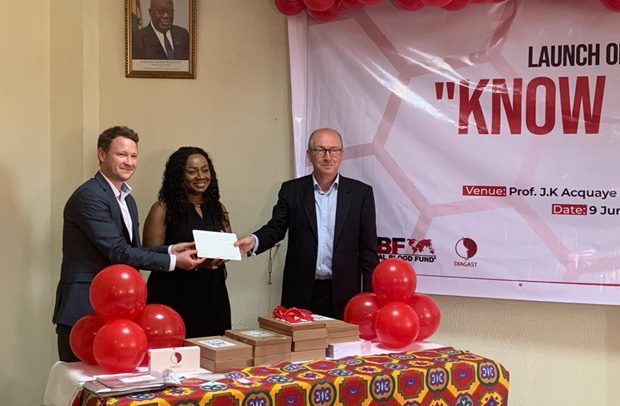Dr. Shirley Owusu-Ofori middle with Evans Gavin (right) and Stephane Eznack (left)
The National Blood Service, Ghana (NBSG), in collaboration with Global Blood Fund and DIAGAST, has launched a project to increase awareness on the various blood groups.
The “Know Your Type” project aims to ensure that individuals are well-informed about their blood type and the significance it holds in emergencies.
It also seeks to bridge the gap between the demand for blood and its availability to save lives, by using a step-by-step approach in recruiting blood donors – also known as the foot-in-the-door approach.
Chief Executive Officer of NBSG, Dr Shirley Owusu-Ofori, speaking at the launch of the project ahead of the World Blood Donor Day marked on June 14, said the need for blood is constant and critical.
She, however, noted that the availability of blood donors often falls short of the demand, leading to immense challenges and preventable deaths.
“It is this pressing need that has ignited our determination to mobilize blood donors effectively and efficiently through the project,” she stated.
The NBS CEO said the project recognised the importance of education surrounding blood types.
“We understand that not everyone is aware of their blood type or the significance it holds in emergencies. Therefore, by launching this initiative, we will be launching a comprehensive public awareness campaign, spreading knowledge about the different blood types, their compatibility, and the crucial role they play in saving lives,” she explained.
Executive Director of Global Blood Fund, Evans Gavin, explaining further said discussions on the project started in 2019, and by January 2020, a draft proposal was considered to support the project. However, COVID-19 hit, and the project was put on hold.
Mr. Gavin thus encouraged Ghanaians to take advantage of the project to know their blood type and become voluntary blood donors.
He said the Global Blood Fund looked forward to continuing their relationship with the National Blood Service to ensure continuous blood availability and sustainability.
Head of Research, Planning Monitoring and Evaluation, Dr. Lucy Asamoah-Akuoko, said the project’s components include mapping out facilities/communities that have not donated blood before, visiting sites to enroll potential blood donors, and exposing them to intervention.
The intervention consists of a free ‘ABO RhD’ test at the operational blood centers using the Diagast ADB pads, delivering test results to potential donors, using specially designed blood group information cards, educating potential donors, and inviting them to donate blood.
The component also includes paying follow-up visits within 2-4 weeks for blood donation and evaluating the impact using questionnaires, qualitative interviews, and a review of data.
General Manager of Africa, DIAGAST, Stephane Eznack, also donated blood typing tools to the NBS to enable the donors know their blood group.
By Jamila Akweley Okertchiri

